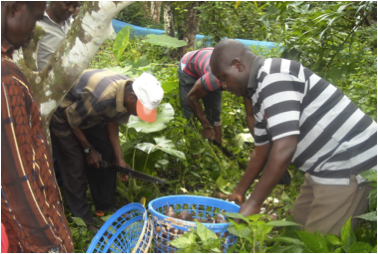The Cross River State Government has commenced the clearing of the pristine Ekuri community forest, preparatory to the construction of a 260km, six-lane highway.

The dissipation of the forest is coming despite appeals by Ekuri community leaders to Governor Ben Ayade to re-route the course of the controversial road as, according to them, it will have telling consequences on the forest resources, which they claim is the major source of their lifestyle and livelihood.
Initially, the community was in support of the project, in the belief that having an arterial road passing by their community would bring to an end the perpetual struggle to secure access to the outside world through the earth road they had built by community effort.
But a Public Notice of Revocation signed by the Commissioner for Lands and Urban Development and published in a local newspaper on 22nd January 2016 decreed that a large piece of land bordering the proposed Super Highway from Esighi, Bakassi Local Government Government Area to Bekwarra Local Government Area of has been revoked for “overriding public purpose absolutely”.
Upon studying the notice and the line profile, the community found that some of the coordinates show that their forest, community lands and settlements would be taken up by the Super Highway and the right of way of 10 Km claimed by the government – beyond the 200 metres right of way allowed from the centre line on each side of the road.
In a petition to the governor, the community tagged the seeming usurpation as a case of “land grabbing.”
The Ekuri Community in the petition dated 6th February 2016 reminded the Cross River State Government that they had for centuries conserved and managed the forest for its rich biodiversity and ecosystems services not only for the community’s sustainable development but for the entire world.
“Since 1992, we pioneered formal community forestry in Nigeria and established the Ekuri Initiative (an NGO registered with the Federal Government) with a mandate in forest conservation, sustainable forest management, community development and poverty reduction,” community members stated in the petition.
The community therefore rejected the passage of the Super Highway through their forest and demand a realignment of the road.
But the petition appears to have irked the government. According to community sources, the letter received a quick but shocking response.
They said: “At the receipt of the protest letter, the governor has quickly sent a bulldozer this morning to Ekuri to begin the destruction of the Ekuri community forest in the name of the Super Highway. This is to show power and strength against poor communities and in defiance of the dictates of the rule of law.”
In a swift response, environmental activist, Nnimmo Bassey, has described the development as a challenge, not just for Ekuri Community but for the entire global community.
He stated: “If the world keeps quiet and allows the bulldozers to have their way, they would not only bulldoze the future of the Ekuri people, the act would entrench impunity, satisfy the lust for capital, promote deforestation in one of the last remaining pristine forest in Africa and blunt our collective hope for tackling global warming.”
Bassey, in a recent article titled: “Dialogue with Bulldozers at Ekuri Community Forest,” described the Ekuri Community Forest as an acclaimed example of how communities can sustainably manage their forest.
“Now, this forest is under threat from the state government that has embarked on the construction of a 260 Km, six-lane dual carriage super highway through their forest, using the highly controversial Land Use Act of 1979 as a cover for dispossessing the people of their land, forest and patrimony.”
According to him, some critics of the project such as the Rainforest Resource Development Centre (RRDC) had stated: “The blue prints of such a huge 260km six-lane Super Highway project running across the entire Cross River State of Nigeria was not made public before the commencement of construction at the ground breaking event. Significantly also, the blue print of the said project has not been made public till this moment. This is a contravention of the Freedom of Information Act, 2011 of the National Assembly as well as other related legislations…”
Bassey, who is director, Health of Mother Earth Foundation (HOMEF), stressed that other significant issues raised include the fact that no credible Environmental Impact Assessment (EIA) has been conducted before the taking off of the project. According to him, the project threatens the Cross River National Park as the highway traverses the buffer zone of the forest.
“In its press briefing of 6th November 2015, the RRDC expressed the fear that, contrary to the requirement of the Land Use Act, no schedules of compensation (including the names of beneficiaries) had been made public.
“The risk is that this project could end up escalating rural poverty if the issues of compensations are neglected. This is so because the affected indigenous people and communities of Cross River State of Nigeria who own these resources could end up losing their sources of livelihoods, income and wellbeing, as well as their natural heritage and and territories.”
